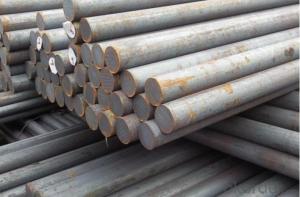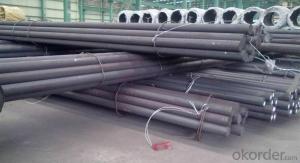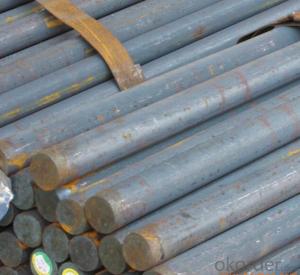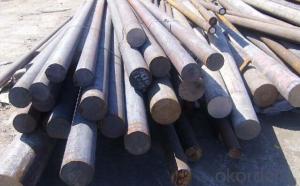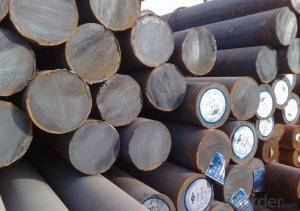Grade SAE 4140 Steel Price_Steel Round Bar Dimension
- Loading Port:
- Shanghai
- Payment Terms:
- TT OR LC
- Min Order Qty:
- 3 m.t.
- Supply Capability:
- 10000 m.t./month
OKorder Service Pledge
OKorder Financial Service
You Might Also Like
Item specifice
Grade SAE 4140 Steel Price_Steel Round Bar Dimension
Details of Grade SAE 4140 Steel Price_Steel Round Bar Dimension
Name | Steel Round Bar |
Shape | Round Bar/Square Bar/Flat Bar/Plate/Wire |
Standard | GB/ASTM/SAE/AISI/DIN/JIS/EN/BS |
Surface Treatment: | Black/Peeling/Polished/Machined |
Delivery Condition: | Hot Rolled or Forged/Peeled or Black Surface |
Test | SGS/UT 100% Elements Testing |
Certificate: | ISO/Mill Certificate |
Service: | 24 hours online service / |
more than 20 years trading and manufacture | |
Quality Assurance: | the third party inspection, such as SGS, BV, TUV…etc. is acceptable |
Packaging Details: | Seaworthy Packaging or as per customer's packing instruction |
Specification of SAE 4140 Steel Price_Steel Round Bar Dimension
1.Size of 4140 Steel Round Bar | ||||||||
Round bar | Diameter(mm) | Length (mm) | ||||||
20~800 | 3000~9000 | |||||||
Plate | Thickness(mm) | Width (mm) | Length (mm) | |||||
Max:800 | Max:2200 | Max:9000 | ||||||
The specification can be customized. | ||||||||
2.Chemical Compositons | ||||||||
Grade | C | Si | Mn | P | S | Cr | Mo | Ni |
42CrMo | 0.38~0.45 | 0.17~0.37 | 0.50~0.8 | ≤0.035 | ≤0.035 | 0.9~1.2 | 0.15-0.25 | ≤0.3 |
4140 | 0.40~0.45 | 0.15~0.35 | 0.75~1.0 | ≤0.035 | ≤0.040 | 0.8~1.1 | 0.15-0.25 | - |
SCM44 | 0.38~0.43 | 0.15~0.35 | 0.60~0.9 | ≤0.030 | ≤0.030 | 0.9~1.2 | 0.15-0.30 | ≤0.25 |
1.7225 | 0.38~0.45 | ≤0.40 | 0.60~0.9 | ≤0.025 | ≤0.035 | 0.9~1.2 | 0.15-0.30 |
|
3.Features of 4140 alloy steel | ||||||||
1. Chromium molybdenum alloy steel | ||||||||
2. Slightly higher carbon content then 4130 | ||||||||
3. Greater strength and heat treatment | ||||||||
4.Typical Applications | ||||||||
1. Applications in the oil and gas sector | ||||||||
2. Connection rods, collets, conveyor pins, | ||||||||
3. Gears, stem assemblies, | ||||||||
4. Pump shafts and tool holders | ||||||||
CNBM Introduction of SAE 4140 Steel Price_Steel Round Bar Dimension Supplier
CNBM International Corporation is the most import and export platform of CNBM group(China National Building Material Group Corporation) ,which is a state-owned enterprise, ranked in 270th of Fortune Global 500 in 2015.
With its advantages, CNBM International are mainly concentrate on Cement, Glass, Iron and Steel, Ceramics industries and devotes herself for supplying high quality series of refractories as well as technical consultancies and logistics solution.
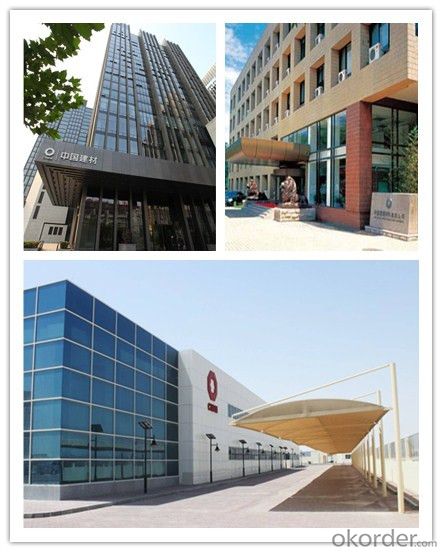
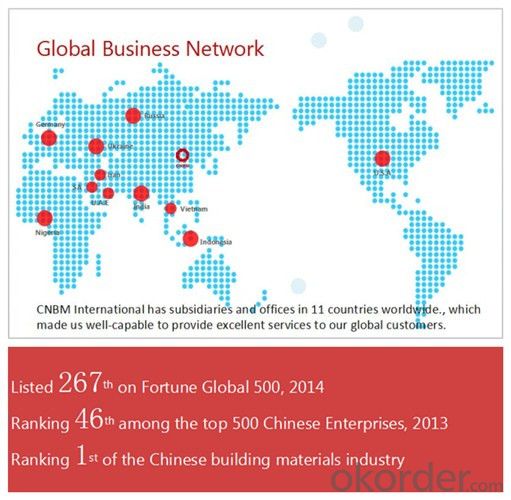
After-sale service |
|
Advantages
|
|
Packaging & Delivery SAE 4140 Steel Price_Steel Round Bar Dimension
Packaging Detail | Sea worthy packing /as per customer's packing instruction |
Delivery Detail | 15 ~ 40 days after receiving the deposit |
Products Show
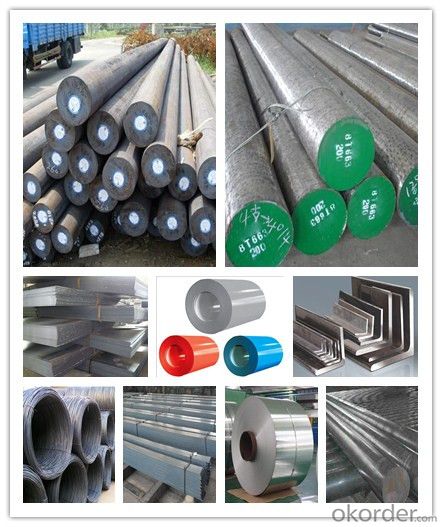
FAQ:
Are you a trading company or manufacturer? | Manufacturer |
What’s the MOQ? | 3 metric ton |
What’s your delivery time? | 15-35 days after downpayment received |
Do you Accept OEM service? | Yes |
what’s your delivery terms? | FOB/CFR/CIF |
What's the Payment Terms? | 30% as deposit,70% before shipment by T/T |
Western Union acceptable for small amount. | |
L/C acceptable for large amount. | |
Scrow ,Paybal,Alipay are also ok | |
Why choose us? | Chose happens because of quality, then price, We can give you both. Additionally, we can also offer professional products inquiry, products knowledge train (for agents), smooth goods delivery, excellent customer solution proposals. |
What's your available port of Shipment? | Main Port, China |
What’s your featured services? | Our service formula: good quality+ good price+ good service=customer's trust
|
Where are your Market? | Covering more than 160 countries in the world |
- Q:What is the chemical composition of special steel?
- Special steel encompasses a wide range of steel alloys that possess specific properties and characteristics. The chemical makeup of special steel can differ depending on the particular grade or type of steel being discussed. Nevertheless, special steel typically contains greater amounts of alloying elements compared to regular carbon steel. These alloying elements may consist of chromium, nickel, molybdenum, vanadium, tungsten, and others. The specific combination and proportion of these alloying elements determine the distinctive properties of special steel, such as increased strength, enhanced resistance to corrosion, improved ability to withstand high temperatures, or better resistance to wear and tear. To illustrate, some common variations of special steel include stainless steel, which generally consists of high levels of chromium and nickel, resulting in excellent corrosion resistance; tool steel, which contains high carbon content and often includes additional elements like vanadium or tungsten, making it suitable for cutting, drilling, or shaping tools; and high-speed steel, which incorporates elements such as molybdenum, cobalt, or tungsten, providing exceptional hardness and heat resistance, ideal for use in cutting tools or drills. To summarize, the chemical composition of special steel varies based on the specific type or grade, but it typically involves elevated levels of alloying elements to achieve desired properties such as strength, corrosion resistance, heat resistance, or wear resistance.
- Q:Can special steel be used in the sporting goods manufacturing industry?
- Yes, special steel can be used in the sporting goods manufacturing industry. Special steel alloys offer superior strength, durability, and corrosion resistance, which are crucial qualities for manufacturing various sporting goods such as golf clubs, bike frames, tennis rackets, and baseball bats. These alloys can be tailored to meet specific requirements, ensuring high performance and longevity in sports equipment.
- Q:What are the common challenges in machining titanium alloys?
- The common challenges in machining titanium alloys include their high chemical reactivity, low thermal conductivity, high cutting forces, and poor chip control. Additionally, titanium alloys tend to work harden, making them prone to tool wear and requiring frequent tool changes. Moreover, their low modulus of elasticity can lead to vibration and chatter during machining operations, affecting surface quality and dimensional accuracy.
- Q:What are the different high-temperature grades of special steel?
- There exists a variety of special steel grades that can withstand extreme heat and provide enhanced mechanical properties. Some of the frequently utilized high-temperature grades are as follows: 1. Stainless steel 310: Renowned for its exceptional resistance to oxidation at high temperatures, this grade boasts a high chromium and nickel content, resulting in excellent corrosion resistance and elevated temperature strength. 2. Inconel 625: Inconel alloys, which are nickel-based superalloys, exhibit remarkable resistance to oxidation and corrosion. In particular, Inconel 625 offers outstanding strength and toughness at high temperatures, rendering it suitable for applications in aerospace and chemical processing industries. 3. Hastelloy X: A notable example is Hastelloy X, a nickel-chromium-iron-molybdenum alloy that showcases extraordinary strength and oxidation resistance at elevated temperatures. It finds widespread use in gas turbine engines, industrial furnace components, and other high-temperature applications. 4. Alloy 800H: This specific grade of special steel is an austenitic alloy that possesses high resistance to oxidation, carburization, and nitridation. It frequently finds application in heat exchangers, furnace components, and petrochemical industries. 5. Titanium Grade 5: While technically not steel, titanium grade 5 is a high-temperature alloy that delivers exceptional strength and corrosion resistance at elevated temperatures. It is commonly employed in aircraft engine components, chemical processing equipment, and marine applications. These examples merely represent a fraction of the high-temperature grades of special steel available in the market. Each grade serves a specific purpose, excelling in various applications that demand extreme heat resistance and specific mechanical properties.
- Q:How is carbon steel used in the manufacturing of pipes and tubes?
- Carbon steel is commonly used in the manufacturing of pipes and tubes due to its high strength, durability, and affordability. Its composition, which includes mainly iron and carbon, provides it with excellent mechanical properties and resistance to corrosion. Carbon steel pipes and tubes are widely used in various industries, including oil and gas, construction, and manufacturing, for conveying fluids, gases, and solids. Its versatility and reliability make it a popular choice for a wide range of applications.
- Q:What are the unique properties of stainless steel?
- Stainless steel has several unique properties that make it highly desirable in various applications. Firstly, it has excellent corrosion resistance, making it resistant to rust and staining, even in harsh environments. Additionally, stainless steel is durable and can withstand high temperatures, making it suitable for use in extreme conditions. It also has a high strength-to-weight ratio, making it strong yet lightweight. Moreover, stainless steel is hygienic and easy to clean, making it ideal for use in food processing and medical equipment. Lastly, stainless steel has an attractive appearance and can be easily fabricated into different shapes, making it a versatile material for various industries.
- Q:What are the different corrosion-resistant special steel alloys?
- Some examples of corrosion-resistant special steel alloys include stainless steel, which contains chromium and nickel for improved resistance to corrosion; duplex stainless steel, which has a combination of austenite and ferrite structures for enhanced corrosion resistance; and super duplex stainless steel, which has even higher levels of chromium, molybdenum, and nitrogen for superior corrosion resistance in harsh environments. Other corrosion-resistant alloys may include nickel-based alloys, titanium alloys, and aluminum alloys.
- Q:How does special steel contribute to the manufacturing of molds and dies?
- Molds and dies are vital tools used across industries such as automotive, aerospace, and electronics to shape materials. They require durability, resistance to wear, and the ability to withstand high temperatures and pressures. Tool steel, also referred to as special steel, possesses distinct qualities that make it ideal for molds and dies. Firstly, its high hardness allows the tools to maintain their shape and surface integrity, even with extensive use and repetitive impacts. This hardness guarantees precision and accuracy in the final product. Furthermore, special steel exhibits excellent wear resistance, crucial as molds and dies come into contact with different materials during manufacturing. This wear resistance prolongs the lifespan of the tools, reducing the need for frequent replacements and minimizing production downtime. Moreover, special steel demonstrates good toughness, enabling it to absorb and endure high impact forces without fracturing or breaking. This is particularly important for molds and dies, which often undergo significant stress during manufacturing, especially when dealing with high-pressure or extreme temperature materials. Special steel also boasts high heat resistance, enabling molds and dies to withstand elevated temperatures used in certain manufacturing processes, such as injection molding or metal forging. This heat resistance prevents warping or loss of shape, ensuring consistent and accurate production. Additionally, special steel is easily machined and shaped, allowing manufacturers to create intricate designs for molds and dies. This versatility is essential as different industries require unique tool designs to meet specific manufacturing needs. In conclusion, special steel is crucial for manufacturing molds and dies due to its high hardness, wear resistance, toughness, heat resistance, and machinability. These unique properties enhance the durability, precision, and efficiency of molds and dies, ultimately improving the quality and productivity of various manufacturing processes.
- Q:How does special steel contribute to improving product resistance to environmental factors?
- Special steel contributes to improving product resistance to environmental factors in several ways. Firstly, special steel alloys often have enhanced corrosion resistance, protecting the product from damage caused by exposure to moisture, chemicals, and other corrosive substances present in the environment. Additionally, special steel can offer improved strength and durability, enabling the product to withstand harsh conditions such as extreme temperatures, high pressure, or mechanical stress. Furthermore, special steel can exhibit excellent fatigue resistance, ensuring that the product maintains its structural integrity even after prolonged exposure to cyclic loading or repetitive stress. Overall, the unique characteristics of special steel make it a valuable material for enhancing the resistance of products to various environmental factors, ultimately prolonging their lifespan and reducing maintenance costs.
- Q:What are the different surface defects in special steel?
- Special steel can experience various surface defects. Some common defects include: 1. Scale, which is a layer of oxide that forms on the steel's surface during manufacturing. This can be caused by high temperatures or improper cooling, leading to a flaky or powdery appearance. The presence of scale can impact the quality and appearance of the steel. 2. Pitting refers to the development of small holes or depressions on the steel surface. It can be caused by corrosion, inadequate cleaning or surface preparation, or exposure to harsh environments. Pitting weakens the steel and makes it more prone to further corrosion. 3. Scratches are physical marks or indentations on the steel's surface. They can occur during handling, transportation, or processing. Scratches affect the integrity and appearance of the steel, often requiring repair or removal. 4. Roll marks are impressions or patterns left on the steel surface during the rolling process. Uneven pressure or improper alignment of rolling equipment can cause these marks, appearing as lines, grooves, or ridges. Roll marks impact the smoothness of the surface and may necessitate additional processing or polishing for removal. 5. Inclusions are foreign particles or substances embedded within the steel. They result from impurities in raw materials or contamination during manufacturing. Inclusions weaken the steel and have the potential to cause cracks or fractures. 6. Decarburization refers to the loss of carbon from the steel's surface layer. This can occur during heating or annealing processes, resulting in reduced hardness and strength. Decarburization is undesirable in special steel as it negatively affects performance. These are just a few examples of the surface defects that can occur in special steel. It is crucial to identify and address these defects to ensure the quality and performance of the steel product.
1. Manufacturer Overview |
|
|---|---|
| Location | |
| Year Established | |
| Annual Output Value | |
| Main Markets | |
| Company Certifications | |
2. Manufacturer Certificates |
|
|---|---|
| a) Certification Name | |
| Range | |
| Reference | |
| Validity Period | |
3. Manufacturer Capability |
|
|---|---|
| a)Trade Capacity | |
| Nearest Port | |
| Export Percentage | |
| No.of Employees in Trade Department | |
| Language Spoken: | |
| b)Factory Information | |
| Factory Size: | |
| No. of Production Lines | |
| Contract Manufacturing | |
| Product Price Range | |
Send your message to us
Grade SAE 4140 Steel Price_Steel Round Bar Dimension
- Loading Port:
- Shanghai
- Payment Terms:
- TT OR LC
- Min Order Qty:
- 3 m.t.
- Supply Capability:
- 10000 m.t./month
OKorder Service Pledge
OKorder Financial Service
Similar products
New products
Hot products
Related keywords

